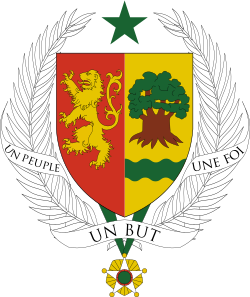 |
|---|
Parliamentary elections were held in Senegal on 9 May 1993. [1] The result was a victory for the ruling Socialist Party, which won 84 of the 120 seats. [2] Voter turnout was around 41%.
 |
|---|
Parliamentary elections were held in Senegal on 9 May 1993. [1] The result was a victory for the ruling Socialist Party, which won 84 of the 120 seats. [2] Voter turnout was around 41%.
| Party | Votes | % | Seats | |||||
|---|---|---|---|---|---|---|---|---|
| National | Departmental | Total | +/– | |||||
| Socialist Party | 602,171 | 56.56 | 40 | 44 | 84 | –19 | ||
| Senegalese Democratic Party | 321,585 | 30.21 | 21 | 6 | 27 | +10 | ||
| Jappoo Liggeeyal Sénégal (RND–CDP–PADS) | 52,189 | 4.90 | 3 | 0 | 3 | New | ||
| Democratic League/Movement for the Labour Party | 43,950 | 4.13 | 3 | 0 | 3 | +3 | ||
| Party of Independence and Labour | 32,348 | 3.04 | 2 | 0 | 2 | +2 | ||
| Senegalese Democratic Union – Renewal | 12,339 | 1.16 | 1 | 0 | 1 | +1 | ||
| Total | 1,064,582 | 100.00 | 70 | 50 | 120 | 0 | ||
| Valid votes | 1,064,582 | 99.44 | ||||||
| Invalid/blank votes | 5,957 | 0.56 | ||||||
| Total votes | 1,070,539 | 100.00 | ||||||
| Registered voters/turnout | 2,613,095 | 40.97 | ||||||
| Source: Direction Générale des Élections | ||||||||